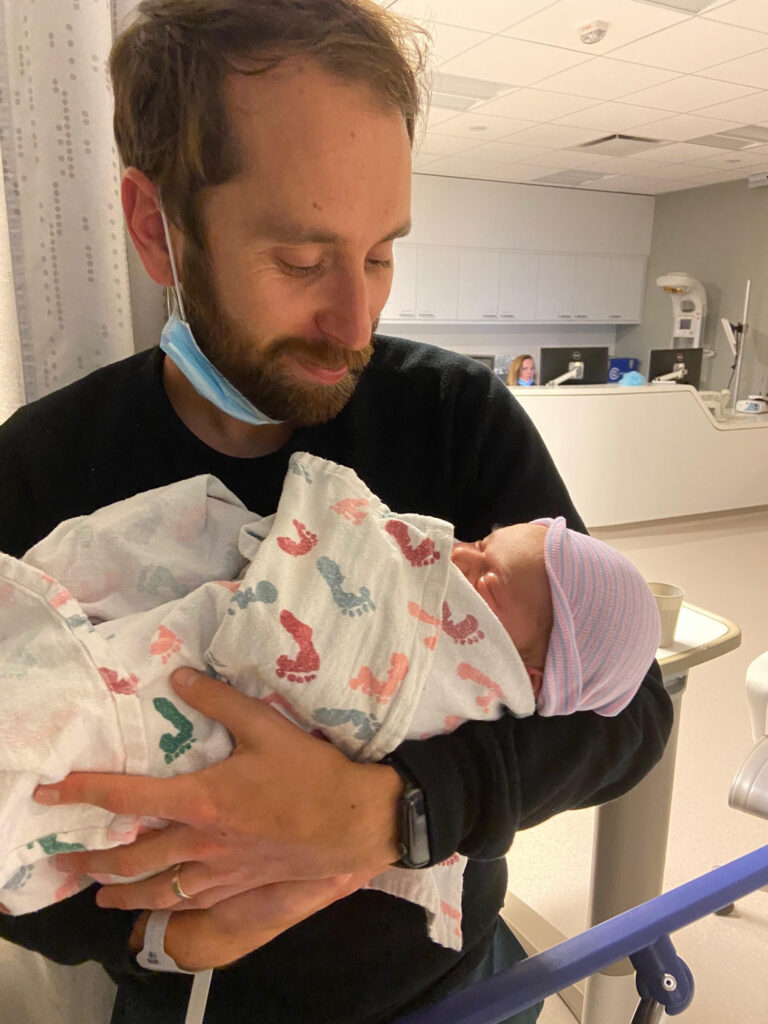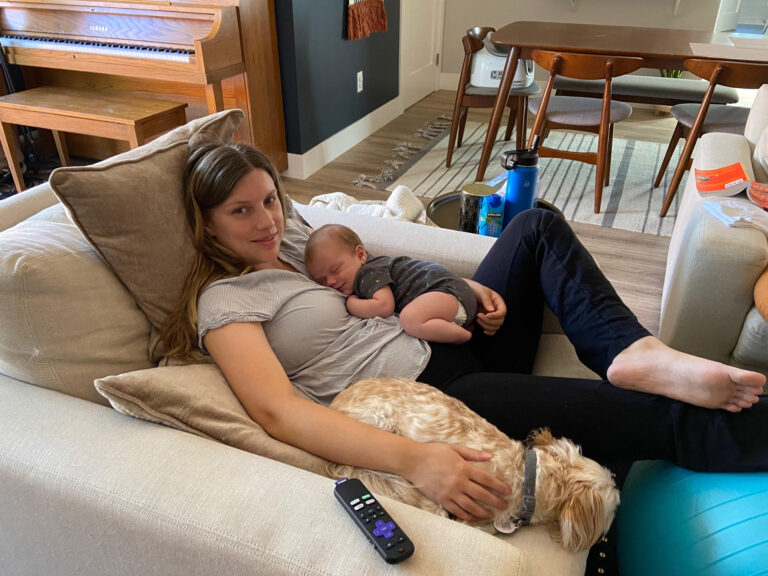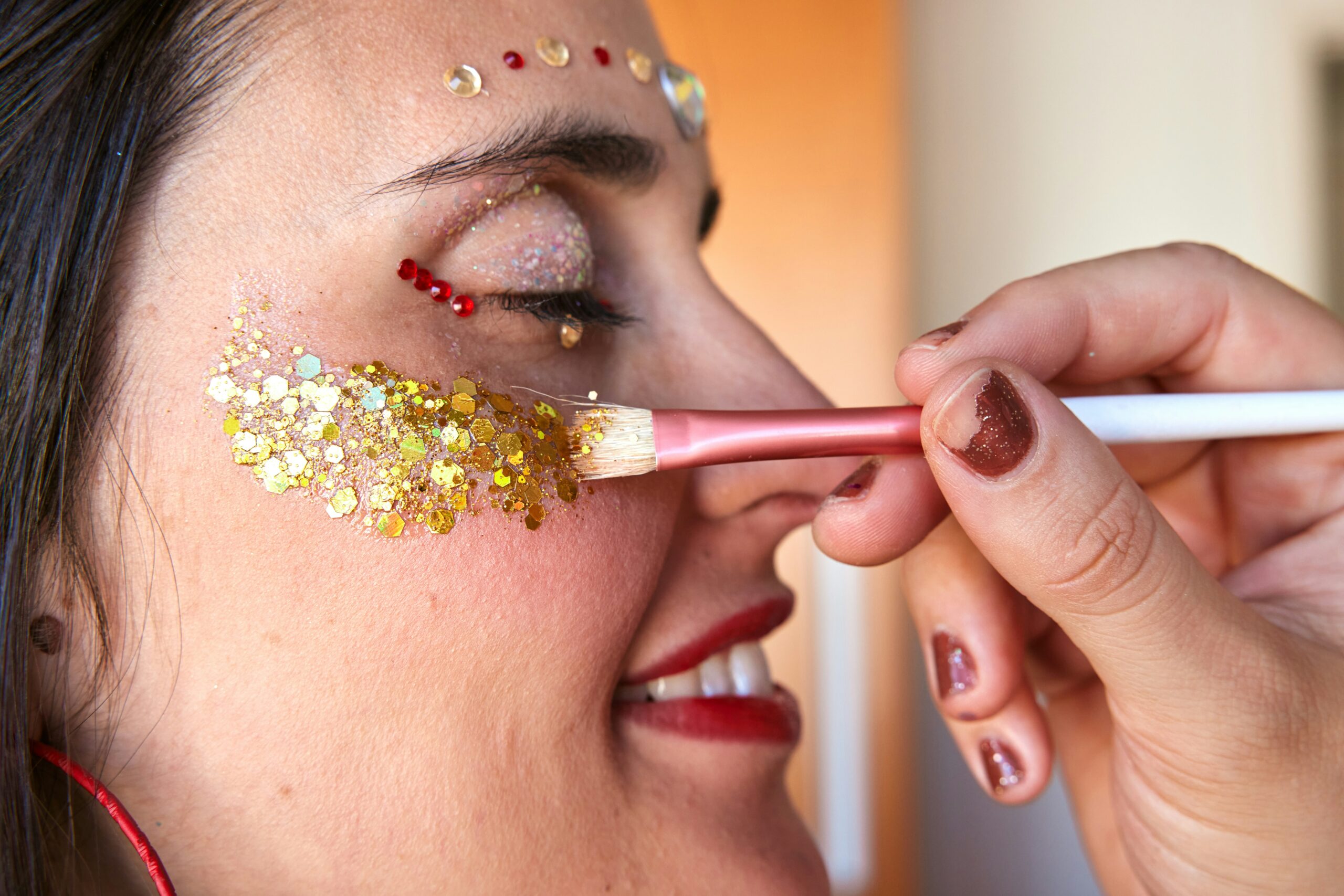Being a C-section mama comes with an aftermath of emotions that bonds us deeply together. The mixture of emotions aren’t so distant to a vaginal birth, yet C-sections still carry stigma—and this can complicate how we process them.
It is my assertion that birth is always natural because it comes from our bodies—so I will use the terms “vaginal” and “cesarean” to distinguish the two because, yes, both are natural.
It’s encouraging to know that cesarean birth has been around since ancient times across the globe. Indigenous healers observed in Uganda and Rwanda during the late 19th century used “banana wine… [or] botanical preparations to anesthetize the patient and promote wound healing” demonstrating that the practice was “well-developed and had clearly been employed for a long time.” Babies who come through the sunroof—as my surgeon joked—enter the world from a different perspective, and we get to process their delivery from another point of view as well.
As a perinatal therapist and a C-section mom, here are some common emotions I help patients work through:
Sadness
Whether planned or not, C-sections bring up sadness. Part of it might be your hormones going haywire. Anesthesia and pain meds can also mess with how your body responds to all those pregnancy hormones. Plus, let’s be honest, everyone’s emotional after giving birth, especially in those first two tumultuous weeks.
But for C-section mamas, there’s so much focus on healing your body, that your feelings might get put on hold and then they pop up out of nowhere weeks or even months later.
Most people come to therapy six to eight months postpartum ready to process a C-section. Sometimes the sadness is because you are grieving a birth plan gone awry. When planned, it’s common for someone to wonder if the grass would have been greener on the other side. Vaginal birth can be held in higher esteem among maternal social circles, but our births are just as beautiful, and we can miss that when listening too closely to other opinions.
The ‘Big Grief’ for many C-sections mama is mourning the loss of the Golden Hour. (And PSA: proceed with caution if you’re not ready to read this.) Golden Hour is the 60 minutes immediately following birth. During this time, skin-to-skin contact is important for regulating baby’s temperature, blood sugar, and heart rate as well as facilitating bonding. It can also help moms to produce hormones for breastfeeding, if desired, and decrease stress.
Many of us miss out on the skin-to-skin time we wanted immediately after birth. Mine was cheek-to-cheek which was cute in its own way—but not what I expected. There is some fear-mongering around the Golden Hour, and I assure you as an attachment-oriented therapist, you can and will have a secure attachment with your baby, even if your skin to skin contact was delayed or not possible at all. Attachment is an ongoing, relational process that occurs over years—so don’t take yourself out of the game so early.

Sadness is a way your heart says “pay attention.” I am famous for saying that sadness is one of the easiest emotions, because once you open yourself to feel it, it feels better. There’s not much to do but allow the sadness to move through you like a river. When I cry and feel like it’ll never end, I remind myself “this will pass.” Tears release hormones, so let them flow. It helps your body return to balance after intense hormonal changes.
For Golden Hour Grief, I really recommend skin-to-skin time with your baby and/or partner. No matter our age, we all benefit from the oxytocin release we get from those we trust. It’s okay if you’re not a touchy feely person:skin-to-skin contact includes play time, feeding, baby wearing, contact naps, and beyond.
If you’re athletic, think about how it feels to enjoy physical contact while in the flow with your sport. If you’re a Care Bear, we don’t even need to tell you twice. If you’re deeply sensory, imagine experiences you enjoy like playing with clay, sand, etc. These are all ways we can regulate ourselves physically, and you can enjoy these things with your loved ones as well. The fact we can continually experience and be changed by human contact, reassures me we get a lifetime to be in a relationship with our children.
Numbness
Numbness is so common and not discussed post cesarean. Again, medicine can be at play here. Many people describe feeling casual or removed when their baby was born. That makes sense given your body is literally numbed to have the procedure completed. I’ve never heard of a doctor or nurse preparing someone for that experience, but it would do a lot for us emotionally to prepare us for this feeling.
To say something as simple as “Hey, you’re on medicine that will numb your body and chill you out. It’s normal to feel less emotional when you see your baby. The emotions will return in time. There’s nothing wrong with you. You’re a great mom.”
Postpartum numbing can be a manifestation of a traumatic response. It is part of our “freeze” response. If your cesarean was an emergency, of course, your body will help you out by numbing up so you can get through the situation. When an event is too overwhelming for our bodies to process, numbing slows things down and can assist you with thinking more clearly. Some folks oscillate between adrenaline and numbing when in survival mode. Think of it as the body’s organic pain medicine. What you can’t feel, can’t hurt you. The postpartum issue is when the numbing doesn’t stop.
If your body finds itself back in relative safety, it may unfreeze with gentle guidance. If your body gets stuck, it may not fully unfreeze until you get help from a professional or trusted other. There’s no “right” way to respond to a stressful situation. Though your body’s response might confuse you, trust that it is actually trying to help you, at least for that moment.
I find that physical activity and mindfulness exercises that require some level of focus are very helpful to unfreeze the body.
As you are able, try gentle stretching or a body scan. Go slowly, with the focus on feeling each part of your body. If you get overwhelmed, stop. Respecting your body’s limitations is a way of respecting yourself and your boundaries.
Numbing is a top sign it’s time to get help and I suggest a professional therapist for this particular emotion in nearly all cases. You deserve to experience a full and satisfying life as a parent and human. Don’t hesitate to find what you need.
Gratitude or Relief
The most not-talked about emotion post cesarean is relief. It is very possible to have a positive and comforting experience with C-sections. Whether it’s attentive and timely medical care, gratitude for life, or heart-warming moments seeing your partner hold your baby, you may find beautiful glimmers in your experience. If there are none, don’t sweat it! We don’t need to bypass your feelings.
I am very passionate about this emotional experience as I felt all three—sadness, numbness, and gratitude/relief—but the relief was so prominent in the hours and days following that I was confused when people labeled my birth “traumatic” without me saying so.
Yes, I felt brave. Yes, I knew I survived an emergency. But overall, I was very happy that my baby was born and that I could walk. When I left the hospital, I looked at the sun and nearly cried. I was so grateful to breathe fresh air—and maybe grab some sushi.

My life became intently focused after that. I prioritized only what was important to me, and I regained a sense of empowerment and purpose in my life that truly felt like an awakening.
Funny enough, I almost felt embarrassed to talk about it in that way.
I didn’t think people would believe me. It took awhile to claim that experience for myself, and once I did—so much space opened up inside to relinquish assumptions and judgments about other parents and their birthing experiences.
Yes, we don’t know what we all go through, so be kind since everyone is fighting a hard battle. But also: some of us are thriving and scared to talk about it. Contentment doesn’t erase the daily struggles or lifetime of hardships. It’s more like part three of ‘Inside Out’: joy is just as much part of our adult brain as sadness, numbness and relief. Because of our increased capacity to hold complex emotions in adult life, dare I say, our joy is sweeter!
Are there glimmers to your experience? Don’t force it, just see what comes up. These questions might help:
- Was there a nurse or staff member who was especially kind to you?
- Did someone make you feel supported or bring a smile to your face?
- Was there anything comical that is actually still funny to you now?
- Did you find some unexpected relief in any part of the process?
It’s okay to remind yourself that it’s over and that can be your one slice of gratitude. No shame, no guilt. Your experience is yours. Claim the good, the bad, the odd, and the ugly.
It can be frustrating when others label your C-section experience, especially medical professionals who requested the information. A helpful technique is to redirect the conversation by highlighting positive aspects of your birth story. For example, you could say:
“I felt really empowered in my choice, so I’m okay with it.”
“I remember when my baby fell quiet when placed cheek to cheek. It was a special moment for me.”

I share the hard parts too, usually with people I trust or who I sense have openness to hearing my perspective. My trick is to keep it short and sweet. The less information, the less people pry about things I don’t want to share. Most people take the hint.
“Yeah, it was a tough birth. I won’t go into detail, because it’s personal.”
“It was an emergency. It’s okay that it wasn’t perfect. No birth is.”
“Maybe I’ll share another time. I want to hear more about…” (redirect conversation)
If I could bottle up all the emotions I feel toward cesarean birth, I think I would need a bigger bottle: It is rugged as hell and it takes quite the badass to both experience and process it. It is as impactful as it is full of surprises. You’re not alone and your experience matters. Don’t suffer in silence. There are folks out there who can understand and support you on your path to thriving.
Author
-

Rachel Ruiz, LCSW, PMH-C, began their journey as a poet and eventually found a calling in social work. Today, as a therapist-activist, Rachel has spent over a decade working closely with families, helping them reconnect and rediscover their bonds. While an adventurer at heart, Rachel stays close to her home in the Sierra foothills of Northern California, hiking and running to channel her rage. Rachel's approach to parenting (and life) is deeply influenced by neurobiology, developmental psychology, and, of course, a bit of fun.
View all posts




